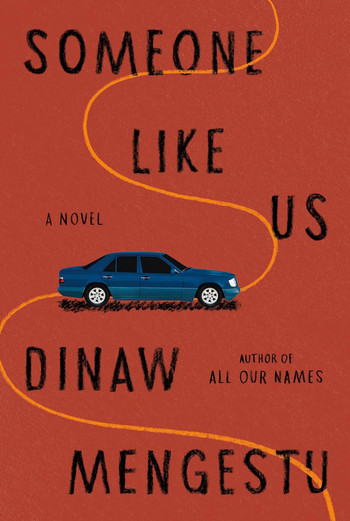At forty-six, Dinaw Mengestu ’05SOA may finally have aged out of his long-running status as a wunderkind — an overused term that in Mengestu’s case was spot-on. The publication of his first novel, The Beautiful Things That Heaven Bears, in 2007, when the Ethiopian-born writer was twenty-eight, set off an international cascade of book prizes, fellowships, awards, and honors. By 2014, Mengestu, still only thirty-five, had published two more novels — How to Read the Air and All Our Names — and won a MacArthur “genius grant.”
In Someone Like Us, Mengestu’s newest novel, his fans will encounter many themes, preoccupations, and even characters familiar from the first three (the protagonist of The Beautiful Things That Heaven Bears resurfaces here in a key supporting role). All four books delineate the immigrant experience in America in prose that is simple and unadorned, yet densely interwoven with recurring words, images, and motifs — and nearly always overlaid with a profound and abiding sadness. Mengestu’s fiction seems at times determined to demonstrate the truth of Tolstoy’s maxim about unhappy families — a truth that goes double, in Mengestu’s world, for immigrant families in the US and triple for African immigrant families in the US, whose lives, in his rendering, are suffused with economic hardship, self-abnegation, alienation, and, often, despair (but each, per Tolstoy, in its own way).
When we meet Mamush, the narrator of Someone Like Us, his life is a shambles. An Ethiopian-American raised in Chicago and Washington, DC, he now lives in Paris with his wife, Hannah, a French photographer, and their almost-three-year-old son, whose early vitality has deteriorated since his first birthday into near immobility, confounding French pediatricians. Mamush’s career as a journalist is languishing to the point of oblivion, as is his marriage, particularly after Hannah confronts Mamush with “scattered remains of various pills and powders that I had crushed or snorted.” When he ends up traveling alone at Christmastime to the DC suburbs on what was originally intended as a family vacation that would introduce his son to his “not-quite American grandmother and almost-grandfather,” Mamush notes the “diminishing odds of our marriage surviving a weeklong separation.” This despite the intense love he and Hannah feel for each other, often expressed, as befits a writer and photographer, “through images, similes, metaphors, when something was like us, but not us.” Indeed, Hannah’s most eloquent texts to Mamush often consist of a single image (reproduced here, in a meta touch, using photographs by Mengestu’s wife, Anne-Emmanuelle Robicquet).
It is no spoiler to state that the other main player in this family drama — Samuel, the “almost-grandfather” who Mamush knows to be his father, though this has never been acknowledged — dies before Mamush makes it to his mother’s door. The death is revealed in the novel’s first sentence. Yet Samuel, an exhausted, pain-ridden, debt-laden, drug-dependent Ethiopian-born DC cabdriver with the heart and mind of a poet and eyes and ears that miss nothing, is powerfully alive throughout. Samuel is stuck in the classic immigrant bind of having fled political turmoil in his own country only to endure back-breaking, low-wage labor and constant racism in his adopted one. “It was always soldiers I was afraid of, but it’s different in America,” he explains to Mamush, after being wrongfully detained by DC police. “No one can understand the rules in this country.”
Samuel emerges in all his multitudinous contradictions via Mengestu’s intricate, almost indescribable artistry, which combines a present-day narrative with flashbacks, memories, passages from an unfinished manuscript that Samuel leaves behind, and, most heart-wrenchingly, an account of a road trip through the American Midwest during which Samuel and Mamush have conversations they’ve avoided for a lifetime. On one stop, they visit an immigrant couple and their two children, whose festive Ohio home, decorated with Christmas reindeer and filled with palpable love, offers both men a glimpse of that elusive happy immigrant family whose existence neither has ever believed possible — a family that, in an alternate universe, Mamush begins to realize, could have been “us, or someone like us.”
The sleight of hand that Mengestu employs to depict this road trip — a magical mystery tour that helps ignite in Mamush a flicker of faith in his own future — is so deft that readers will be left gasping (through tears) and wondering, “How did he do that?” Whereupon they will immediately go back and reread the entire section — partly to figure it out, but mostly to savor it all over again.



